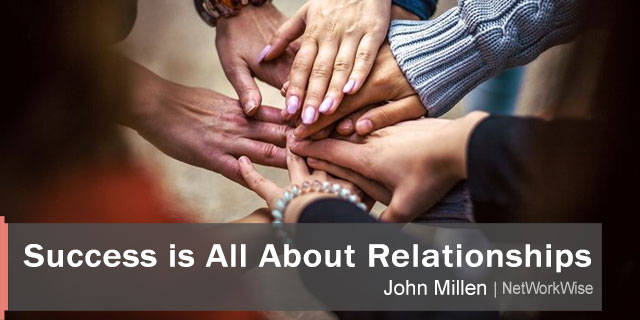While working with 20 mid-level financial consulting leaders in Texas recently, I emphasized the critical need to develop relationships in all directions inside and outside their huge consulting firm.
That’s because, when you think about it, what’s the one thing that all successful people have in common?
Intelligence? No.
Good looks? Nope.
Hard work? Not necessarily.
The real answer is relationships.
Behind every successful person … or more accurately, around every successful person, is a network of people who are there to provide the appropriate support at the right time. Think about it. No one has done anything alone.
Steve Jobs? He had Steve Wozniak and a legion of other great minds contributing intellectual capital and engineering skills.
LeBron James? He had four other starters, a bench full of role players and various coaches and trainers, as well as a community that protected and nurtured him in his journey.
No individual achievements
No one has ever done anything alone. Even accomplishments that seem to be individual achievements are backed by a lifetime of relationships that brought that person to that moment.
In fact, it seems the more established and influential the network someone has, the greater the person’s ability to achieve — to champion ideas, to solve problems, and to lead others.
There are no exceptions. Personal and professional success is, and forever will be, tied to building a network of relationships.
Unfortunately, the term “networking” has been tainted as negative by people who think it’s all about schmoozing at business functions and handing out business cards.
The truth is that great networking is really about creating, building and maintaining relationships. And at the heart of any relationship — whether personal or professional — is communication. It’s that simple.
The truth is that great networking is really about creating, building and maintaining relationships.
My friend Frank Agin makes his living helping others create successful relationships. Frank is the founder and president of AmSpirit Business Connections, a franchise organization that helps people to develop stronger business relationships through structured weekly meetings.
Frank is also an author. In his book Foundational Networking: Building Know, Like and Trust to Create A Lifetime of Extraordinary Success, Frank writes that effective networking is not about rehearsed statements or formulaic activities. Rather effective networking is about getting people to know, like and trust us.
How do we communicate (in both word and deed) to get others to know, like and trust us? Frank says there is no magic to this; no secret tricks.
In Foundational Networking, Frank advocates that getting people to know, like and trust us is merely a function of our attitudes and habits surrounding three things: Presence, Altruism, and Integrity.
Here is how he describes those attributes:
Presence
Presence involves your attitudes and habits toward how you carry yourself and how you appear to others. In other words, what do your words and actions communicate to the world around you?
Ask yourself, who are you drawn to …
- The person who is happy or the person who is gloomy?
- The person who expresses optimism or the person who is pessimistic?
- The person who demonstrates great courage or the person who lives in a state of fear?
No doubt, you are attracted to the happy, optimistic and courageous person. Now answer this: When people see you, what do they see? When they hear you, what do they hear? In a quiet, private moment, give yourself that honest assessment.
To build relationships that, remember, ultimately drives success, you need to adopt attitudes and habits that communicate happiness, optimism, and courage. These things will attract people to you.
Altruism
Altruism is next. It involves all your attitudes and habits related to your disposition toward contributing to the lives of others. That is, to what extent are you committed to giving to the world around you — not just money or physical assets, but also time and talent.
Ask yourself, who are you are drawn to, the person who is focused on giving to the world around them or the person who is focused on getting from it? You likely answered the giver.
And that answer is consistent with the research Dr. Adam Grant reported in his book Give and Take: A Revolutionary Approach To Success.
Now honestly assess yourself. To what extent do your words and actions communicate benevolence? What do you give? To whom do you give? Why?
You need to remember that when it comes to communicating an altruistic attitude, it’s not really about what you give, or how much you give. Rather, what matters most is the spirit that moves you. Know that people are drawn to those who genuinely communicate a generous spirit.
Integrity
Integrity, finally, involves your attitudes and habits with respect to how you interact with others. Who are you drawn to, the trustworthy person or the person whose integrity comes into question?
While the answer to that question is rhetorical, you can make a candid assessment of your own integrity. Are you trustworthy, doing the right thing even if it might not be in your best interest? Are you reliable, doing what you say you are going to do?
It’s important to understand that you shouldn’t answer these questions on the basis of major interactions or significant transactions alone. While those are important to be sure, 99.9% of the population passes those tests.
Where this assessment is most critical is the little things. After all, this is where others judge you the most, looking to see how you communicate your integrity when the stakes may not be as high and when very few people are watching.
Success is Relationship-Based
In summary, Frank notes that your success is tied to others. It is your relationships and how you communicate with the people around you.
As such, Frank says your attitudes and habits need to be geared towards communicating …
- A happy, optimistic, and courageous existence;
- A willingness to contribute to the people around you; and,
- An air of honesty and reliability with everything you do.
This is how others will come to know, like and trust you, developing relationships that foster success for you, and for them.
John Millen works with leaders and other high achievers who want to show the world their best, most authentic self. To learn more about his work, visit JohnMillen.com









